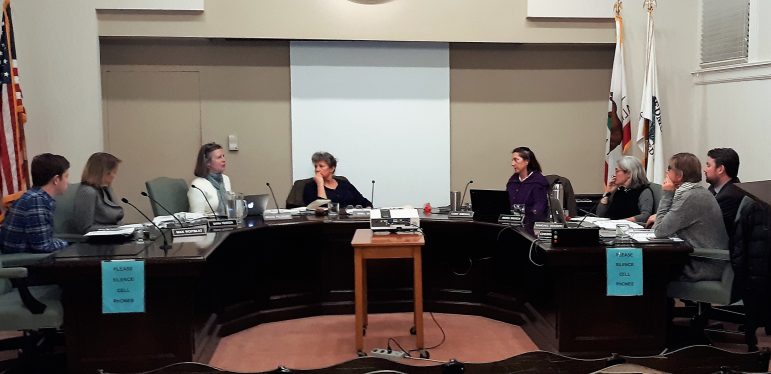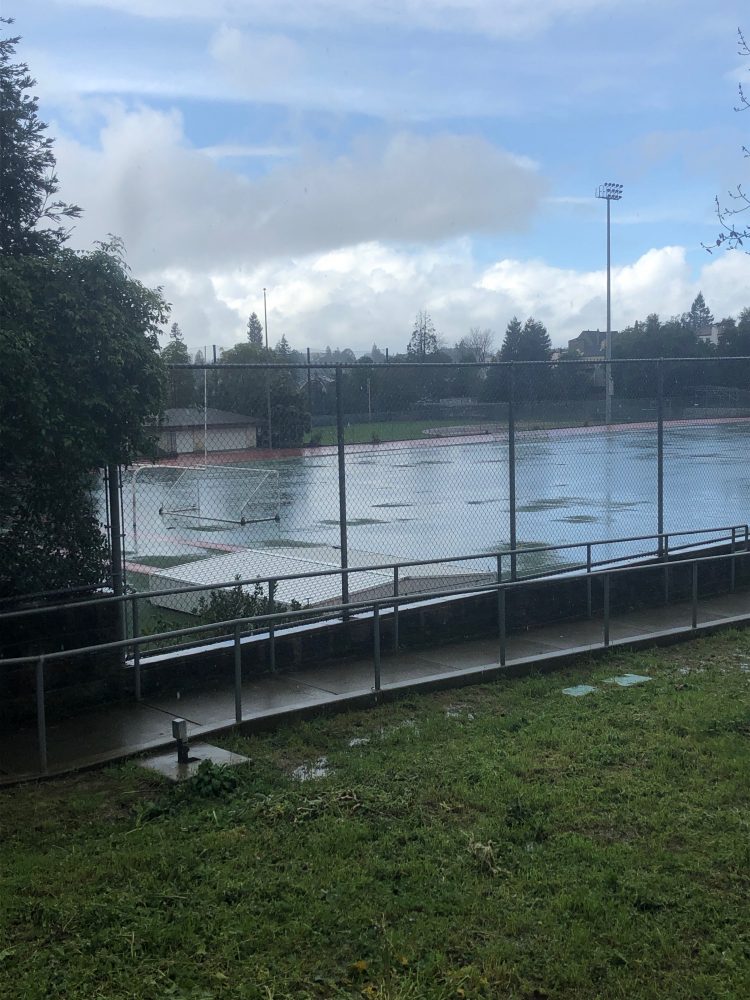Witter Field users will have to wait a while, possibly at least a year, for a new drainage system and track and turf to be installed.
While the last replacement of turf and track was in 2007, and the usual need is to replace every eight years, Witter has been maintained well enough to have some more time on its side, according to district representatives. But the winter rain is presenting a challenge for the field’s underground drainage system, which needs a lengthier and costlier repair than the track and synthetic turf. Rain pools above and below the turf, which has led at times to closing the field.
At the Feb. 13 school board meeting, Trustee Cory Smegal said the field was flooded when she passed it that morning after a rainy night.
All of the field’s repairs will cost between $3.2 million and $3.4 million said schools Superintendent Randall Booker. Because completion of the STEAM and theater buildings and modernizing the 20s and 30s buildings will likely consume the remaining bond funds from the $66.1 million measure voters passed in 2016, the district will use state funds for Witter’s renovation.
The district is eligible to receive an estimated $4 million to $6 million from the state, although, Booker said, that money may not disbursed for several years because timing may be dependent on future state bond measures.
He recommended, and the board agreed, to defer the Witter project for at least one year until there is a clear time frame for getting state funds. However, there may be some good news sooner.
Booker announced at the meeting that the district will soon apply for financial help from the state’s Facility Hardship Program. The district and the city will apply jointly, he said. In the meantime, the district will use the Witter fund, which has about $400,000, to increase maintenance of the Witter complex. If the state approves hardship funds, it likely will not pay 100 percent of the renovation costs, although there are exceptions.
The district has been spending from $6,000 to $10,0000 annually to manage the effects of flooding and keep the field open. As the turf and track degrade, the costs are anticipated to rise by about $30,000 to $50,000 annually.
The hope was to begin the renovation this spring, Booker said, but skyrocketing costs in construction materials and changes in building requirements for other projects, such as the upcoming new STEAM building, are using more of the bond money than anticipated.

Kindergarten building expansion deferred at least one year
Two years ago, the district started extended-day kindergarten at each elementary school and is now considering the feasibility of expanding kindergarten facilities. Numerous challenges are involved in expanding the size of classrooms and adding restrooms and will take time to plan and implement.
Since school enrollment is below capacity, the district’s Facilities Steering Committee deferred kindergarten expansion at least until other planned projects are finished. The kindergarten matching grant fund program is relatively new and the state has not yet issued full guidelines for funding criteria and procedures. The district will take the first formal step in the application process Feb. 27 toward garnering state dollars for kindergarten facility expansions.
Completed bond projects
The district has spent roughly $7 million of bond funds. Expenditures are reviewed periodically by the Citizens Bond Oversight Committee, which will issue its second annual report to the community in March.
So far, the bond funds have gone toward:
- Installing ventilation and climate control equipment in 15 elementary classrooms, preventing classroom overheating. The work included infrastructure to make it cost-efficient to install these systems in additional classrooms in the future.
- Converting two offices in the PHS 30s building into one computer classroom with 34 workstations to help meet rising demand for computer classes without waiting until the STEAM building is completed.
- Installing a new climate control system for part of the PHS 30s building and infrastructure to expand the system to the remainder of the building in the future, replacing steam radiators and a boiler.
- Installing new doors, hardware and electronic locks at Piedmont Middle School.
- Surveying underground utilities at the high school campus to prepare for construction of the new STEAM and theater buildings, and preserve and reuse these utilities.
Bond projects still to come
Upcoming projects include building a new high school STEAM facility starting this spring; build a new high school theater starting in summer 2020; modernize high school classrooms; and replace antiquated building systems and modernize classrooms in PHS’ 20s and 30s buildings.
In other business the board:
- Saw a slide show presentation of results from the 2016-2017 California Healthy Kids Survey, which is used to gather data from grade 7, 9, 10 and 12th-grade students about school climate and safety, learning supports and barriers, stakeholder engagement, and youth development, health, and well-being. The data is used at the district and school level to develop and refine goals. In addition to the standard questions developed by the state, the district added questions for high school students concerning student sexual relationships.
- Discussed the current interdistrict transfer policy and if and how it could be modified to include extended transfer opportunities for out-of-district students. The discussion was a follow-up to a request during a Jan. 28 meeting, when a speaker asked the district to consider allowing grandchildren of Piedmont residents to attend Piedmont schools. Some students who live outside of the city are allowed to attend Piedmont schools in certain circumstances, such as when parents are constructing or remodeling a home, for example, or are children of PUSD and city employees. The board asked for a list of pros and cons to be developed regarding changing the current policy and all agree the matter is complicated.
- Booker announced nominations are being accepted for the Arthur Hecht Volunteer of the Year award until 4:30 p.m. March 18. Nomination forms are at the district’s website or at the district’s office or by calling Sylvia Eggert, administrative assistant to the superintendent, at (510) 594-2614.
